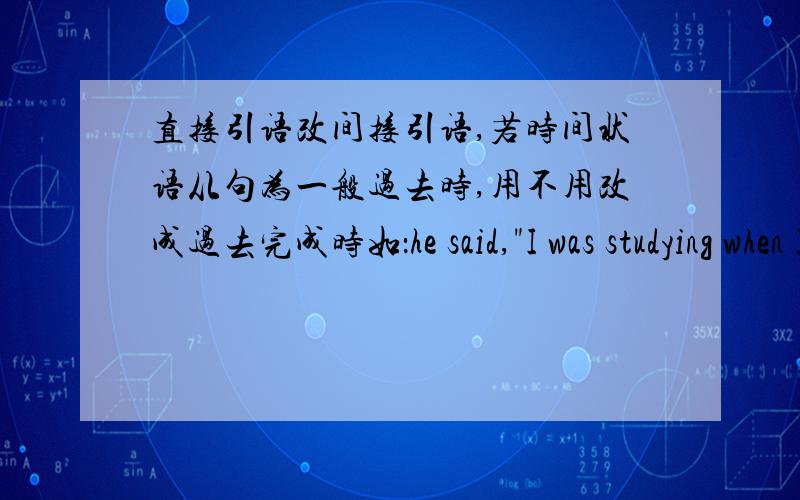直接引语改间接引语,若时间状语从句为一般过去时,用不用改成过去完成时如:he said,"I was studying when I saw it."
来源:学生作业帮助网 编辑:作业帮 时间:2024/11/15 20:29:06

直接引语改间接引语,若时间状语从句为一般过去时,用不用改成过去完成时如:he said,"I was studying when I saw it."
直接引语改间接引语,若时间状语从句为一般过去时,用不用改成过去完成时
如:he said,"I was studying when I saw it."
直接引语改间接引语,若时间状语从句为一般过去时,用不用改成过去完成时如:he said,"I was studying when I saw it."
一、如何变人称:
下面有一句顺口溜“一随主.二随宾,第三人称不更新”.“一随主”是指在直接引语变间接引语时,如果从句中的主语是第一人称或被第一人称所修饰.从句中的人称要按照主句中主语的人称变化如:
She said. "My brother wants to go with me. "→She said her brother wanted to go with her.
“二随宾”是指直接引语变间接引语时,若从句中的主语及宾语是第二人称.或被第二人你所修饰.从句中的人称要跟引号外的主句的宾语一致.如果引号外的主句没有宾语.也可以用第一人称,如:
He said to Kate. "How is your sister now?"→He asked Kate how her sister was then.
“第三人称不更新”是指直接引语变间接引语时.如果从句中的主语及宾语是第三人称或被第三人称所修饰从句中的人称一般不需要变化如:
Mr Smith said. "Jack is a good worker."→Mr Smith said Jack was a good worker.
二、如何变时态:
直接引语在改为间接引语时、时态需要做相应的调整.
现在时它需改为过去时态;过去时态改为完成时;过去完成时则保留原来的时态.如:
1)She said. "I have lost a pen."→She said she had lost a pen
2)She said. "We hope so."→She said they hoped so.
3) She said. "He will go to see his friend."→She said he would go to see his friend.
但要注意在以下几种情况下.在直接引语变为间接引语时,时态一般不变化.
①直接引语是客观真理.
"The earth moves around the sun and the moon moves around the earth, the teacher told me. → The teacher told me the earth moves around the sun and the moon moves around the earth.
②直接引语是过去进行时,时态不变.如:
Jack said. "John, where were you going when I met you in the street?"→Jack asked John where he was going when he met him in the street.
③直接引语中有具体的过去某年、某月、某日作状语,变为间接引语时,时态不变.如:
Xiao Wang said. "I was born on April 2l, 1980." →Xiao Wang said he was born on April 20, 1980.
④直接引语如果是一般现在时.表示一种反复出现或习惯性的动作,变间接引语,时态不变.如:
He said, "I get up at six every morning." →He said he gets up at six every morning.
⑤如果直接引语中的情态动词没有过去时的形式(例:ought to, had better, used to)和已经是过去时的形式时,(例:could, should, would, might)不再变.如:
Peter said. "You had better come have today." →Peter said I had better go there that day.
三、如何变状语:
直接引语变间接引语,状语变化有其内在规津,时间状语由“现在”改为“原来”(例:now变为then, yesterday.变为 the day before)地点状语,尤其表示方向性的,或用指示代词修饰的状语,由“此”改为“彼”(例:this 改为that),如:
He said, "These books are mine." →He said those books were his.
四、如何变句型:
①直接引语如果是陈述句,间接引语应改为由that引导的宾语从句.如:She said, "Our bus will arrive in five minutes."→She said that their bus would arrive in five minutes.
②直接引语如果是反意疑问句,选择疑问句或一般疑问句,间接引语应改为由whether或if引导的宾语从句.如:He said, "Can you swim, John?" →He asked John if he could swim.
"You have finished the homework, haven‘t you?" my mother asked. →My mother asked me whether I had finished the homework.
"Do you go to school by bus or by bike?" →He asked me if I went to school by bus or by bike.
③直接引语如果是特殊问句,间接引语应该改为由疑问代词或疑问副词引导的宾语从句(宾语从句必须用陈述句语序).
She asked me, "When do they have their dinner?"→ She asked me when they had their dinner.
④直接引语如果是祈使句,间接引语应改为"tell(ask, order, beg等) sb (not) to do sth."句型.如:
"Don’t make any noise," she said to the children. →She told (ordered) the children not to make any noise. "Bring me a cup of tea, please," said she.→She asked him to bring her a cup of tea.
⑤直接引语如果是以“Let‘s”开头的祈使句,变为间接引语时,通常用“suggest +动句词(或从句).”如:
He said, "Let’s go to the film." →He suggested going to the film.或He suggested that they should go to see the film.
引述别人的话有两种方式:一是使用引号引出人家的原话,这叫做直接引语;一是用自己的话把人家的话转述出来,这叫做间接引语.例如:
John said, "I’m going to London with my father."
约翰说:"我要和父亲到伦敦去."(引号内是直接引语)
John said that he was going to London with his father.
约翰说,他要和他父亲去伦敦.(宾语从句是间接引语)
由直接引语变为间接引语,分以下情况:
1. 直接引语是陈述句时
间接引语为that引导的宾语从句(口语中that可以省略),主句的引述动词主要有say ,tell, repeat, explain, think等.
He said , "You are younger than I."-’He said (that ) I was younger than him.
2.直接引语是疑问句时
间接引语为陈述语序:主句的谓语动词say 改为ask,或改为wonder, do not know, want to know, be not sure, be puzzled等.
(1) 一般疑问句或反意疑问句变为if (whether)引导的宾语从句.
She said, "Do you often come here to read newspapers?"
→She asked me if (或whether)I often went there to read newspapers.
She asked me , "You have seen the film, haven’t you?"
→She asked me whether(或if )I had seen the film.
(2) 选择疑问句变为whether….or 宾语从句.
I asked him, "Will you stay at home or go to a film tonight?"
→I asked him whether he would stay at home or go to a film that night.
(3)特殊疑问句变为由原来的疑问词引导的宾语从句.
He asked , "Where do you live?"
→He asked me where I lived.
3.直接引语是祈使句时
间接引语为不定式,作ask , tell, beg, order, warn, advise等动词的宾语补足语(don’t 变为not ).
The teacher said to the boy, "Open the window."→The teacher told the boy to open the window.
His father said to him , "Don’t leave the door open."→His father told him not to leave the door open.
[注意]
(1) 有些表示建议、提议、劝告或要求的祈使句,可以用suggest ,insist等动词 加以转述.例如:
He said, "Let’s go to the theatre."
→He suggested (our )going to the theatre.或He suggested that we(should) go to the theatre.
(2) "Would you mind opening the window?" he asked.
→He asked me to open the window.
"Why don’t you take a walk after supper?" he asked .
→he advised me to take a walk after supper.
"Shall we listen to the music?" he asked.
→He suggested listening to the music.
4.直接引语是感叹句时
间接引语为what 或how 引导,也可以用that 引导.
She said, "What a lovely day it is !"
→She said what a lovely day it was .或She said that it was a lovely day.
5.如果主句谓语动词为各种现在时或一般将来时,则间接引语中的动词仍保持直接引语原来时态.如果主句谓语动词为过去时,间接引语中的动词时态按下列变化:
(1) 一般现在时变为一般过去时
(2) 现在进行时变为过去进行时
(3) 一般将来时变为过去将来时
(4) 现在完成时变为过去完成时
(5) 一般过去时变为过去完成时
(6) 过去完成时不变,仍为过去完成时
[注意]
(1) 如果直接引语是表示客观真理时,变为间接引语,一般现在时不改为一般过去时.如:
The teacher said "The earth goes round the sun."
→The teacher said that the earth goes round the sun.
(2) 如果直接引语中有明确表示过时间的状语,变为间接引语时,一般过去时不改为过去完成时.如:
He said to me, "I was born in 1973."
→He told me that he was born in 1973.
(3)如果直接引语所述事实在当时和目前同样生效,变为间接宾语时,一般现在时不改为一般过去时.如:
He said, "I’m a boy, not a girl."
→He said that he is a boy ,not a girl.
(4)如果直接引语中的谓语动词表示一种反复出现或习惯动作,在变为间接引时,一般现在时不改为一般过去时.如:
The girl said, "I get up at six every morning."
→The girl said that she gets up at six every morning.
(5)如果直接引语中含有since, when, while 引导的表示过去时间的状语从句,在变为间接引语时,只改变主句中的谓语动词,从句的一般过去时则不变.如:
He said to me, "I have taught English since he came here ."
→He told me that he had taught English since he came here.
(6)如果直接引语中含有情态动词 must, need, had better以及情态动词的过去式could, might, should, would,在变为间接引语时,这些情态动词没有时态的改变.例如:
The teacher said to me . "You must pay more attention to your pronunciation."
→The teacher told me that I must (have to ) pay more attention to my pronunciation.
He said , "I could swim when I was only six ."
→He said that he could swim when he was only six.
6.代词等一般地应作用相应的变化.
指示代词 this ---that
these--- those
表示时间的词 now --- then
today--- that day
this week(month ,etc) ----that week (month ,etc)
yesterday ----the day before
last week(month) --- the week(month) before
three days(a year)ago---three days(a year)before
tomorrow ----the next (following ) day
next week(month)--the next(following)week(month)
表地点的词 here --there
动词 bring -- take
come --go